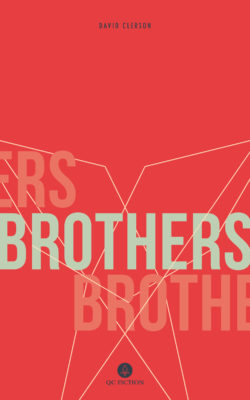We all have family mythologies. Those stories told and retold of previous generations: a grandmother who survived perils to immigrate to North America, or the tale of how our parents found each other. These stories colour how we see ourselves and the world around us. They’re often born out of struggle, or loss, and we defend their veracity as we would our very honour, no matter how distorted they may become with the retelling. In the novel Brothers, David Clerson harnesses the power of these stories and amplifies it with the force of fable to create a tale of violence, loss, revenge, and ultimately rebirth.
The two eponymous brothers of the novel are never named. They live – the older brother and the younger brother – on the shores of a salt marsh in the valley of Hinnom, gathering all manner of obscurities brought in by the Great Tide to trade in the local village for honey or smoked herring. They play in a bone yard, forming chimeric creatures from the skeletal remains of animals that died during famine. Their fading mother constantly tells them the stories of their origins. How their father, a beast of a dog, emerged from a sea full of unspeakable monsters. How she had borne them “at an age beyond motherhood” and ritualistically removed the older brother’s arm to form the younger brother, as a way to ensure he would never be left alone with the world’s cruelty.

Brothers
David Clerson
Translated by Katia Grubisic
QC Fiction
$19.95
paper
150pp
9781771860864
The novel wears multiple skins, each of the four sections an evolutionary stage towards the breaking of the mother’s spell. Katia Grubisic’s translation of the text offers flowing, unadorned prose that sings with the depth and simplicity of the story. And though we know we’re under the same spell as the brothers, Clerson’s narrative charms lead us wilfully to unknown and unthinkable places. Pushed beyond the brink beneath the weight of hunger, exhaustion, guilt, and exposure to the elements, new lucidities are wrought through layers of hallucinatory revelation. At times, the human degradation is so extreme the reader wishes the fabulist elements to be true because the alternative is too horrific to imagine.
Brothers shows us the power of personal and collective mythologies to shape our destinies, if only as a result of the actions they can manifest. Unfortunately, reality often has crueller things in mind for us when we fail to engage with it on its own terms. By following the fate of Clerson’s brothers, we are witness to the horrific and fantastical extremes of this phenomenon. In the end, the reader is left with a single feather of hope, and the knowledge that beautiful monsters lurk at the fringes of CanLit. mRb






0 Comments